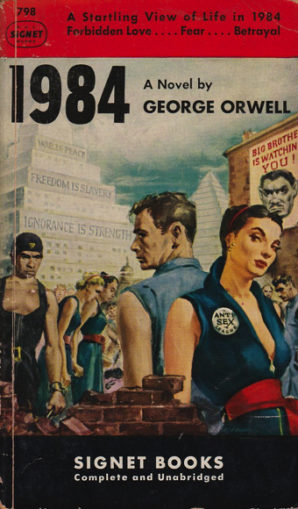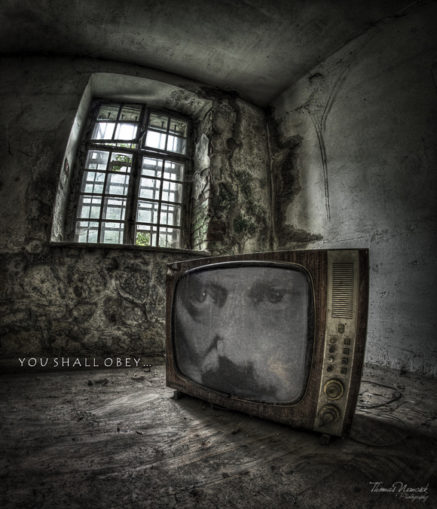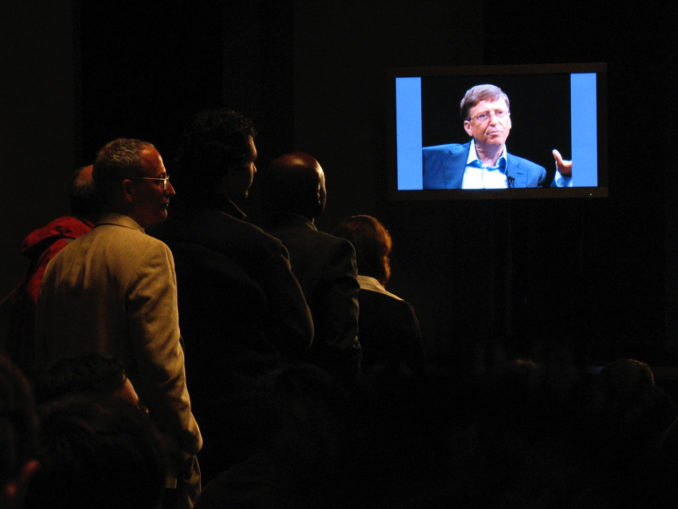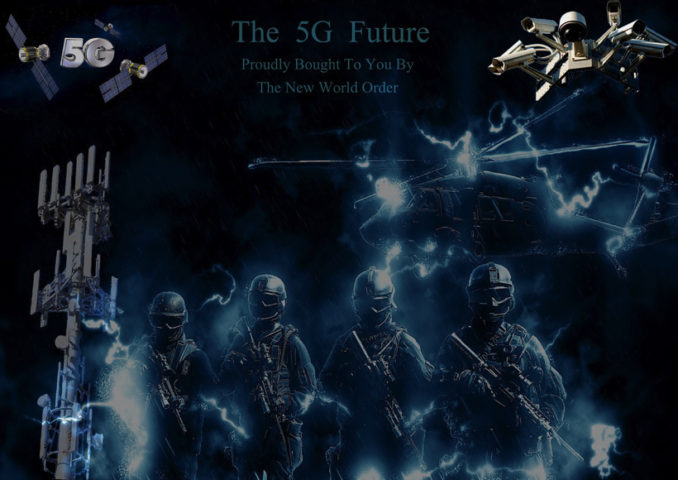
1984,
Chris Protopapas – Public Domain
The totalitarian novel is a relatively new genre, the most well known of these being (in no particular order) Arthur Koestler’s Darkness at Noon, Aldous Huxley’s Brave New World, and C.S. Lewis’s That Hideous Strength, but by far the most famous & well-reviewed is George Orwell’s 1984. Not many people know that the word “totalitarian” did not exist before the 20th century. The oldest word for the worst possible form of government is “tyranny” — a word Aristotle defined as the rule of one person, or of a small group of people, in their own interests and according to their will. Totalitarianism was unknown to Aristotle, because it is a form of government that only became possible after the emergence of modern science and technology. The old word “science” comes from a Latin word meaning “to know.” The new word “technology” comes from a Greek word meaning “to make.” The transition from traditional to modern science means that we are not so much seeking to know when we study nature as seeking to make things — and ultimately, to remake nature itself. That spirit of remaking nature — including human nature — greatly emboldens both human beings and governments. Imbued with that spirit, and employing the tools of modern science, totalitarianism is a form of government that reaches farther than tyranny and attempts to control the totality of things.
In the beginning of his history of the Persian War, Herodotus recounts that in Persia it was considered illegal even to think about something that was illegal to do — in other words, the law sought to control people’s thoughts. Herodotus makes plain that the Persians were not able to do this. Today we are able to get closer through the use of modern technology. In Orwell’s 1984, there are telescreens everywhere, as well as hidden cameras and microphones. Nearly everything you do is watched and heard. It even emerges that the watchers have become expert at reading people’s faces. The organization that oversees all this is called the Thought Police. If it sounds far-fetched, look at China today: there are cameras everywhere watching the people, and everything they do on the Internet is monitored. Algorithms are run and experiments are underway to assign each individual a social score. If you don’t act or think in the politically correct way, things happen to you — you lose the ability to travel, for instance, or you lose your job. It’s a very comprehensive system. And by the way, you can also look at how big tech companies in the UK are tracking people’s movements and activities to the extent that they are often able to know in advance what people will be doing. As an example just look at those helpful ads which pop up when you’re browsing GP – all carefully selected for your viewing based on your internet activity ….. Even more alarming, these companies are increasingly able and willing to use the information they compile to manipulate people’s thoughts and decisions.
The protagonist of 1984 is a man named Winston Smith. He works for the State, and his job is to rewrite history. He sits at a table with a telescreen in front of him that watches everything he does. To one side is something called a memory hole — when Winston puts things in it, he assumes they are burned and lost forever. Tasks are delivered to him in cylinders through a pneumatic tube. The task might involve something big, like a change in what country the state is at war with: when the enemy changes, all references to the previous war with a different enemy need to be expunged. Or the task might be something small: if an individual falls out of favour with the state, photographs of him being honoured need to be altered or erased altogether from the records. Winston’s job is to fix every book, periodical, newspaper, etc. that reveals or refers to what used to be the truth, in order that it conform to the new truth. One man, of course, can’t do this alone. One of the chief questions raised by the book is, what makes this worth the effort? Why does the regime do it? Winston’s awareness of this endless, mighty effort to alter reality makes him cynical and disaffected. He comes to see that he knows nothing of the past, of real history: “Every record has been destroyed or falsified,” he says at one point, “every book has been rewritten, every picture has been repainted, every statue and street and building has been renamed, every date has been altered. And that process is continuing day by day and minute by minute. . . . “nothing exists except an endless present in which the Party is always right.” Does any of this sound familiar?
In his disaffection, Winston commits two unlawful acts: he begins writing in a diary and he begins meeting a woman in secret, outside the sanction of the state. The family is important to the state, because the state needs babies. But the women are raised by the state in a way that they are not to enjoy relations with their husbands. And the children — as in China today, and as it was in the Soviet Union — are indoctrinated and taught to spy and inform on their parents. Parents love their children but live in terror of them all the time. Think of the control that comes from that — and the misery. Society exists in well-defined strata in 1984. There is the Inner Party, whose members hold all the power. There is the Outer Party, to which Winston belongs, whose members work for — and are watched and controlled by — the Inner Party. And there are the proles, who live and do the blue-collar work in a relatively unregulated area. Winston ventures out into that area from time to time. He finds a little shop there where he buys things. And it is in a room upstairs from this shop where he and Julia, the woman he falls in love with, set up a kind of household as if they are married. They create something like a private world in that room, although it is a world with limitations — they can’t even think about having children, for instance, because if they did, they would be discovered and killed. In the end, it turns out that the shopkeeper, who had seemed to be a kindly old man, is in fact a member of the Thought Police. Winston and Julia’s room contained a hidden telescreen all along, so everything they have said and done has been observed. In fact, it emerges that the Thought Police have known that Winston has been having deviant thoughts for twelve years and have been watching him carefully. When the couple are arrested, they have made pledges that they will never betray each other. They know the authorities will be able to make them say whatever they want them to say — but in their hearts, they pledge, they will be true to their love. It is a promise that neither is finally able to keep.
After months of torture, Winston thinks that what awaits him is a bullet in the back of the head, the preferred method of execution of both the Nazis and the Soviet Communists. In Koestler’s Darkness at Noon, the protagonist walks down a basement hallway after confessing to crimes that he didn’t commit, and without any ceremony he is shot in the back of the head — eradicated as if he were vermin. Winston doesn’t get off so easy. He instead undergoes an education, or more accurately a re-education. His final stages of torture are depicted as a kind of totalitarian seminar. The seminar is conducted by a man named O’Brien (someone perhaps who might struggle to get a booking confirmed at Pontins) who as he alternately raises and lowers the level of Winston’s pain, leads him to knowledge regarding the full meaning of the totalitarian regime.

You shall obey…,
zeitfaenger.at – Licence CC BY-SA 2.0
As the first essential step of his education, Winston has to learn doublethink — a way of thinking that defies the law of contradiction. In Aristotle, the law of contradiction is the basis of all reasoning, the means of making sense of the world. It is the law that says that X and Y cannot be true at the same time if they’re mutually exclusive. For instance, if A is taller than B and B is taller than C, C cannot be taller than A. The law of contradiction means things like that. In our time, the law of contradiction would mean that a government minister say, could not simultaneously hold that the COVID pandemic renders church services too dangerous to permit, and also that BLM protest marches are fine. It would preclude a man from declaring himself a woman, or a woman declaring herself a man, as if one’s sex is simply a matter of what one wills it to be — and it would preclude others from viewing such claims as anything other than preposterous. The law of contradiction also means that we can’t change the past. What we can know of the truth all resides in the past, because the present is fleeting and confusing and tomorrow has yet to come. The past, on the other hand, is complete. Aristotle and Thomas Aquinas went so far as to say that changing the past — making what has been not to have been — is denied even to God. Because if something both happened and didn’t happen, no human understanding is possible. And God created us with the capacity for understanding. That’s the law of contradiction, which the art of doublethink denies and violates. Doublethink is manifest in the fact that the State Ministry in which Winston is tortured is called the Ministry of Love. It is manifest in the three slogans displayed on the state’s Ministry of Truth: “War is peace. Freedom is slavery. Ignorance is strength.” And as we have seen, the regime in 1984 exists precisely to repeal the past. If the past can be changed, anything can be changed — man can surpass even the power of God. But still, to what end?

Waiting in line for Bill Gates,
Eric Chan – Licence CC BY-SA 2.0
Why do you think you are being tortured? O’Brien asks Winston. The Party is not trying to improve you, he says — the Party cares nothing about you. Winston is brought to see that he is where he is simply as the subject of the state’s power. Understanding having been rendered meaningless, the only competence that has meaning is power.
“Already we are breaking down the habits of thought which have survived from before the Revolution,” O’Brien says. We have cut the links between child and parent, and between man and man, and between man and woman. No one dares trust a wife or a child or a friend any longer. But in the future, there will be no wives and no friends. Children will be taken from their mothers at birth, as one takes eggs from a hen. The sex instinct will be eradicated. Procreation will be an annual formality like the renewal of a ration card. . . . There will be no loyalty, except loyalty toward the Party. There will be no love, except the love of Big Brother. There will be no laughter, except the laugh of triumph over a defeated enemy. . . . All competing pleasures will be destroyed. But always — do not forget this Winston — always there will be the intoxication of power, constantly increasing and constantly growing subtler. Always, at every moment, there will be the thrill of victory, the sensation of trampling on an enemy who is helpless. If you want a picture of the future, imagine a boot stamping on a human face — forever”.
Nature is ultimately unchangeable, of course, and humans are not God. Totalitarianism will never win in the end — but it can win long enough to destroy a civilization. That is what is ultimately at stake in the fight we are in. We can see it in the rise and imposition of doublethink, we can see it in the increasing attempt to airbrush & rewrite our history, and we can see its impulse writ large amongst the most powerful forces in our politics and culture……

The 5g Guarantee,
Paul Hurtado – Public Domain
© DJM 2021
The Goodnight Vienna Audio file



